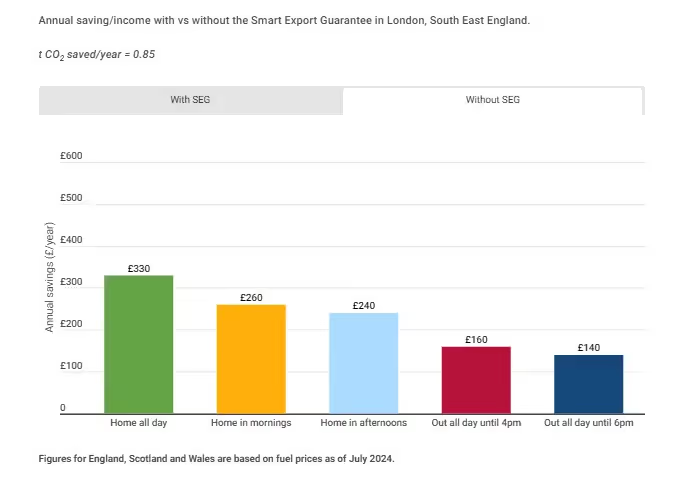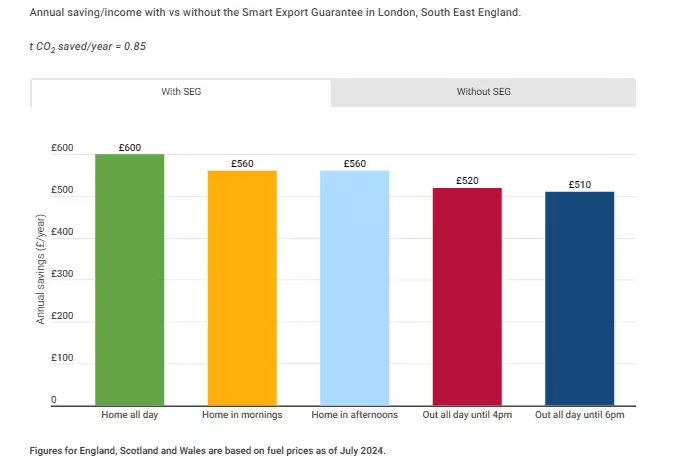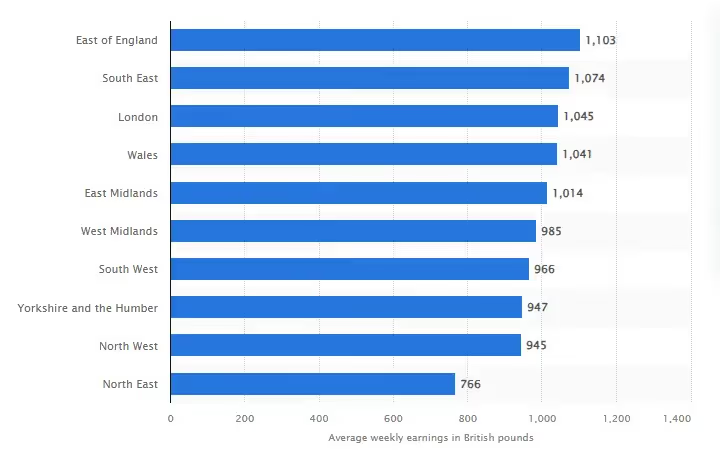
This is a 10-minute guide. So if you’re short for time, bookmark our solar panel cost page for later, and read this short overview instead…
Average solar panel costs in the UK sit at £7,000 for a 3.5kW system. This price spikes to around £12,000 when using a suitable solar battery.
There are government grants that enable specific households to get free solar panels (or at least, discounts). These include the likes of ECO4 and HUG.
However, if you don’t qualify for a means tested benefit, you’ll be looking at the 0% VAT scheme and generating cash to pay for your solar panels via the Smart Export Guarantee (selling excess electricity back to the grid).
The £7,000 / £12,000 figures mentioned above are estimates. Expect all of the following to have a bearing on exactly how much your solar panels cost:
Taking everything above into account, expect your solar panels to pay for themselves within 10-15 years.
You can get fixed prices for your system using our clickable tool here. Or, read on for a more detailed guide to solar panel costs.
The average solar panel installation cost for a 3-bedroom property in the UK sits at £7,000. The cost would cover labour and materials for a 3.5kWp system which utilises up to 10 solar panels.
It’s worth bearing in mind that one of the biggest variables when it comes to the cost of solar panel fitting is whether or not you use a solar battery.
For the 3.5kWp solar panel system mentioned above, a suitably sized solar panel battery could cost around £5,000. This will bump the overall cost of your solar panel project to around £12,000.
See the exact cost of solar panel installation for your property by using our solar panel tool here.
For a typical solar panel system that doesn’t use a battery, approximately 50% of the installation cost is associated with labour.
In the case of the 3.5kWp 10 panel system mentioned above, that’s going to mean approximately £3,500 in material costs. Materials include the likes of:
The cost of labour makes up the other 50% of your installation price. As with materials, expect the labour costs associated with fitting solar panels to be in the region of £3,500.
Solar panel costs (labour only) cover the likes of:
For those planning to install a solar battery, this would be installed between step 4 and step 5.
The exact price to fit solar panels isn't a one size fits all approach. There are dozens of variables that affect the exact price, and some of these can affect prices by thousands of pounds.
Below, we’ve covered the variables that affect the average cost of solar panel installation the most.
Prefer to jump right in and get a quote? Use our 2-minute clickable solar panel tool here, and get fixed prices on-screen within a couple of minutes.
There are solar panel grants available in the UK, some of which even mean that certain households get free solar panels.
Typically, to be eligible for government grants to reduce solar panel installation costs, you’ll need to be eligible for a means tested benefit. If you are, it’s worth investigating the following schemes:
Other government schemes that can help reduce the overall cost of your solar panels include the 0% VAT scheme for clean energy solutions and the Smart Export Guarantee (SEG).
Currently, the 0% VAT scheme is automatically applied by your installer. This saves homeowners thousands on their solar panel installation costs. As of January 2024, the government extended their 0% VAT scheme until 2027, which includes 0% VAT on solar batteries.
After 2027, homeowners will still benefit from a reduced 5% rate (rather than 20%). That said, with the government pushing more towards their net zero target, it’s likely to be extended indefinitely at some point in the near future.
Whilst the Smart Export Guarantee (SEG) won’t save you money on the initial cost of solar panels, you’ll earn over time, reducing the overall payback period. Essentially, it helps to increase your overall return on investment.
Put simply, SEG allows you to sell back any excess electricity you produce to the grid. It’s a way of generating a small income from your solar panels from electricity production that otherwise would go to waste.
Typical savings on electricity bills for solar panels (without the use of SEG) sit at around £330 per year.

However, using the SEG scheme, you’ll be able to bump these savings considerably, with average savings increased to £600 per year:

This means you could be earning approximately £50 per month, which could be used directly to pay for your solar panels (for those that have chosen to get their solar panels on finance).
You can spread the cost of solar panels using finance. Whilst there are some 0% solar panel finance deals on offer, they’re few and far between.
Expect an interest rate somewhere in the region of 14.9% APR over a 10-year term. And of course, you’ll need to add interest to the overall cost of your solar panel installation.
Interest charged on solar panel finance is something that’s often overlooked. Below, we’ve provided a few examples of interest associated with getting your solar panels on finance:
As you can see, the term and APR have a huge bearing on how much you pay, so here’s what you need to do:
See exact costs for solar panel installation with or without finance, by using our clickable tool here.
Where you’re situated in the UK is going to have an affect on the price you pay for your solar panels to be fitted.
A company in the East of England, will have to pay their solar panel fitters a lot more than those based in somewhere like the North East.

As you can see from the above graph courtesy of Statista, the average salary for construction workers in the East of England is £1,103 per week, whereas it’s £766 in the North East.
That’s an approximate 30% difference in labour costs to fit solar panels. With labour costs on a £7,000 system coming in at around £3,500, you could see a swing in solar panel costs of £1,000, simply due to where you live.
We operate nationwide and offer fixed prices regardless of location. Use our solar panel tool here to get fixed prices on-screen and start producing clean and free energy!
The bigger the kW output of your solar panel system, the more it's going to cost.
Of course, there are more variables than simply output such as: the brand you choose, efficiency, installer cost, ease of roof access and more.
However, below, are some estimated costs for solar panel systems based on kW output:
The average cost of solar panels above are estimates based on property size; they don’t account for the cost of a suitable storage battery and labour costs associated with installing one.
Find out what size solar panel system you need and how much it costs using this tool.
The better quality the panels you use, the more they’re going to cost. But, choosing high quality and efficient panels is going to be worth it in the long-term.
Solar panels cost £140-£280 per panel. The more panels you need? The more your system is going to cost.
With an averaged sized system using approximately 10 panels, you’d be looking at an overall cost of solar panels in the region of £1,400-£2,800.
Remember, this is the price for solar panels only, not other materials or labour!
In general, solar panels work at 15-25% efficiency. A panel running at 15% efficiency rather than 25% efficiency is going to produce 40% less electricity over its lifespan.
So, we know the overall cost of higher quality panels is around £1,400 more, and they’ll produce approximately 40% more electricity.
To give us a rough indication as to whether this additional investment is worth it, we can look at the Energy Saving Trust’s estimates here:

Highly efficient solar panels could save around £600 per year, or £12,000 if they last for 20 years. A panel producing 40% less electricity would reduce your bills by £360 per year, or £7,600 if they last for 20 years.
Put simply, you’d save £4,400 more with the panels offering higher efficiency over the 20 year lifespan.
Accounting for the £1,400 extra upfront cost, you’d still save an additional £3,000; they’re absolutely worth investing in!
Apart from the size (in kW) of the system you install, choosing whether or not to have battery storage is the next biggest variable when it comes to the cost of installing a solar panel system.
At times, your solar panels will be producing more electricity than you’re currently using. If you don’t have a battery, the options are:
If you have solar panels fitted and you’re having to buy back electricity from the grid at any time, a solar battery could be the answer.
You don’t want to sell back to the grid only to buy it back later. Why? Simply because what the grid pays per kWh (approximately 5p) via the Smart Export Guarantee, is nowhere near what you’ll pay to buy it back (approximately 22p per kWh).
Put simply, you want to be self-sufficient, and a solar battery helps you do that.
Expect solar panel installation costs including a battery to be approximately £5,000 more than a basic panel system that doesn’t utilise a battery. So, a 3.5kW system costing £7,000 would be £12,000 with a suitably sized solar battery.
You can get solar panel prices (with or without a battery) on-screen using our clickable tool here.
Expect your solar panels to pay for themselves within 10-15 years. After this point you’ll be able to generate “free” electricity for approximately 10-15 years; the lifespan of an average system is 20-25 years.
Like costs, there are factors that affect the overall timeline, including the likes of daily sunlight hours and even electricity prices. For instance, if electricity prices double in the next 5 years, you’ll see your solar panel payback period halve!
We’ve written a detailed guide to the average solar panel payback period here.
Try our free quote tool. You'll have your personalised quote in under a minute.